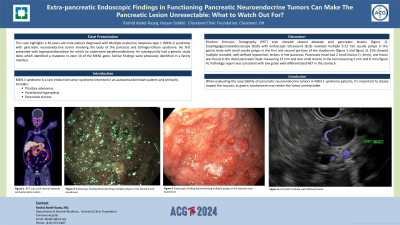Tuesday Poster Session
Category: Biliary/Pancreas
P3525 - Extra-Pancreatic Endoscopic Findings in Functioning Pancreatic Neuroendocrine Tumors Can Make the Pancreatic Lesion Unresectable: What to Watch Out For?
Tuesday, October 29, 2024
10:30 AM - 4:00 PM ET
Location: Exhibit Hall E

Has Audio

Rashid Abdel-Razeq, MD
Cleveland Clinic
Cleveland, OH
Presenting Author(s)
Rashid Abdel-Razeq, MD1, Hassan Siddiki, MD2
1Cleveland Clinic, Cleveland, OH; 2Digestive Disease Institute, Cleveland Clinic, Cleveland, OH
Introduction: Multiple endocrine neoplasia type 1 (MEN1) is a rare endocrine tumor syndrome inherited in an autosomal dominant pattern and primarily includes pituitary adenomas, parathyroid hyperplasia and pancreatic tumors.
Case Description/Methods: This case highlights a 36-years-old male patient diagnosed with MEN-1 syndrome with pancreatic neuroendocrine tumor involving the body of the pancreas and Zollinger-Ellison syndrome. He first presented with hyperparathyroidism for which he underwent parathyroidectomy. He subsequently had a genetic study done which identified a mutation in exon 10 of the MEN1 gene, R460X (CGA >TGA). Similar findings were previously identified in a family member.
Discussion: Positron Emission Tomography (PET) scan showed several dotatate avid pancreatic lesions (figure I). Esophagogastroduodenoscopy with endoscopic ultrasound revealed multiple 5-12 mm sessile polyps in the gastric body with small sessile polyps in the first and second portions of the duodenum (figure II). EUS showed multiple rounded, well-defined hypoechoic lesions in the pancreas. Pancreatic head had 2 small lesions (< 4mm), one lesion was found in the distal pancreatic body measuring 15 mm and two small lesions in the tail measuring 5 mm and 8 mm (figure IV). Pathology report was consistent with low grade well-differentiated NET in the stomach.

Disclosures:
Rashid Abdel-Razeq, MD1, Hassan Siddiki, MD2. P3525 - Extra-Pancreatic Endoscopic Findings in Functioning Pancreatic Neuroendocrine Tumors Can Make the Pancreatic Lesion Unresectable: What to Watch Out For?, ACG 2024 Annual Scientific Meeting Abstracts. Philadelphia, PA: American College of Gastroenterology.
1Cleveland Clinic, Cleveland, OH; 2Digestive Disease Institute, Cleveland Clinic, Cleveland, OH
Introduction: Multiple endocrine neoplasia type 1 (MEN1) is a rare endocrine tumor syndrome inherited in an autosomal dominant pattern and primarily includes pituitary adenomas, parathyroid hyperplasia and pancreatic tumors.
Case Description/Methods: This case highlights a 36-years-old male patient diagnosed with MEN-1 syndrome with pancreatic neuroendocrine tumor involving the body of the pancreas and Zollinger-Ellison syndrome. He first presented with hyperparathyroidism for which he underwent parathyroidectomy. He subsequently had a genetic study done which identified a mutation in exon 10 of the MEN1 gene, R460X (CGA >TGA). Similar findings were previously identified in a family member.
Discussion: Positron Emission Tomography (PET) scan showed several dotatate avid pancreatic lesions (figure I). Esophagogastroduodenoscopy with endoscopic ultrasound revealed multiple 5-12 mm sessile polyps in the gastric body with small sessile polyps in the first and second portions of the duodenum (figure II). EUS showed multiple rounded, well-defined hypoechoic lesions in the pancreas. Pancreatic head had 2 small lesions (< 4mm), one lesion was found in the distal pancreatic body measuring 15 mm and two small lesions in the tail measuring 5 mm and 8 mm (figure IV). Pathology report was consistent with low grade well-differentiated NET in the stomach.

Figure: (I) Positron Emission Tomography (PET) showing pancreatic lesions, (II - III) Endoscopic findings demonstrating multiple polyps in the stomach and duodenum, (IV) Endoscopic ultrasound demonstrating hypoechoic lesions in the pancreas
Disclosures:
Rashid Abdel-Razeq indicated no relevant financial relationships.
Hassan Siddiki: Boston Scientific consulting – Consultant.
Rashid Abdel-Razeq, MD1, Hassan Siddiki, MD2. P3525 - Extra-Pancreatic Endoscopic Findings in Functioning Pancreatic Neuroendocrine Tumors Can Make the Pancreatic Lesion Unresectable: What to Watch Out For?, ACG 2024 Annual Scientific Meeting Abstracts. Philadelphia, PA: American College of Gastroenterology.
